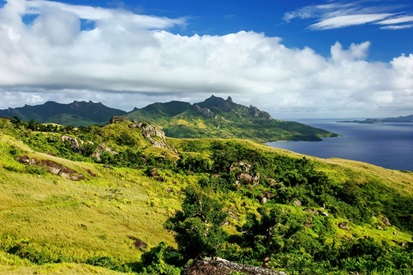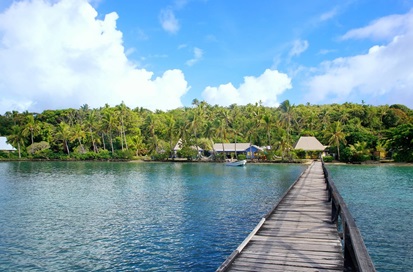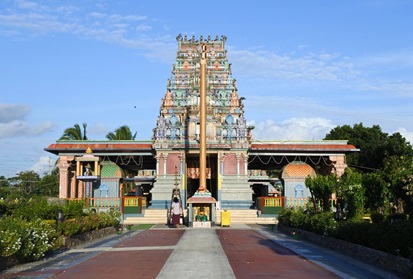

The Fiji archipelago is located in the southern hemisphere, in the Pacific Ocean. These areas are characterized by a tropical climate. Summer, in the usual sense, lasts all year round here. There are never sudden changes in temperature, but the quality of a holiday on the islands may depend on the amount of precipitation. The dry season occurs from late spring to late autumn. The wet season corresponds to the period from the beginning of winter to mid-spring. Thus The Fijian winter falls from May to November, and summer lasts from December to April.
To avoid getting completely confused :
- From December to April it is humid and hot.
- From May to November it is dry and warm.
The velvet season for a versatile holiday in Fiji is winter, or more specifically, the period from mid-May to early October , when the weather is comfortable for all resort activities - beach leisure, water sports, excursions, road trips and trekking .

Depositphotos
Climate and weather in Fiji by month
The average temperature remains at 28-30°C throughout the year . The water in the ocean near the coasts is on average consistently warmed up to 28-29°C.
Fiji in January
The wet season is in full swing. Prices for hotels, transfers and services drop significantly, because out of 4 weeks, 2 or even 3 rain. The highest humidity is observed on the northern island of Rotuma (up to 340 mm), while on Viti Levu - up to 270 mm. The maximum air temperature for Fiji is up to 30-31 °C at daytime and 23-24 °C at night. Water temperature 28 °C.
Fiji in February
In February, the water temperature on the beaches is like fresh milk - up to 31 ° C , while there is a noticeable stuffiness. The larger islands of Viti Levu , Vanua Levu and Taveuni experience tropical rainfall much more frequently, especially in the highlands. The small islands of the Mamanuca and Yasawa groups experience more comfortable weather with short-term precipitation. It rains in Fiji on the 19-20 days of February. During the day the air warms up to 30 °C , and at night to 24°C.

Depositphotos
Fiji in March
On the larger islands, the peak of rainy weather occurs in March. The sun is already trying to make its way through the hanging clouds, so the rains are more or less short-lived, but they come often. Water and air temperatures reach maximum levels of 30-31°C. The humidity is very high, especially inland.
Fiji in April
In terms of air and water temperatures, April may be practically no different from March. The only observation is that strong air humidity is no longer felt on the coast. The weather is very hot. April is still a low season due to still the same frequent rains. But during this period, precipitation becomes, for the most part, short-term. If persistent rain is not a problem for you, April is quite suitable for relaxation. Moreover , prices during this period are not so high.
Fiji in May
May in Fiji will be one of the most favorable months. Moderate humidity with a slight chance of precipitation. If it starts to rain quickly, the sun will immediately shine after it. The air temperature is stable - up to 31 °C during the day and 24 °C at night. Due to the low level of humidity, the heat is not felt as much. An ideal time for travel and active recreation.

Depositphotos
Fiji in June
In June the winter season begins. The air temperature drops to 26-28 °C during the day and 20 °C at night. The water on the coasts is also well warmed up. By the end of May it may drop a couple of degrees, but conditions for swimming and snorkeling remain comfortable. The average daily precipitation is about 220 mm.
Fiji in July
The peak of the high season is in July. Sunny days, pleasant breeze, comfortable air and water temperatures. June offers all the opportunities for travel, mountain hiking, diving and many other ways to have fun on the tropical islands. The average daily precipitation is about 200 mm.
Fiji in August
remains identical to July . The most velvet period for a holiday on any of the Fiji islands. Air temperature during the day is 28 °C , at night about 20°C. The entire month has up to 15 wet days with short-term precipitation. Moderate heat and low humidity allow you to enjoy all the benefits of a tropical winter climate.

Depositphotos
Fiji in September
The average air temperature during the day is 26-27 °C , at night 20 °C. The water temperature in the ocean drops a couple of degrees and averages 25°C. On the northern island of Rotuma, the ocean on the coast still warms up to 28°C. Conditions for a great vacation during this period are more than comfortable.
Fiji in November
November is the end of the high season in Fiji. The air and water are warmed a couple of degrees higher than in October. The number of rainy days also increases slightly, but there is still the possibility of catching a few hours of sunshine throughout the day. Of the 30 days of the month, the probability of rain extends to 15-17, with an average rainfall of up to 285 mm.
Fiji in December
December is one of the cheapest holiday seasons in Fiji, for obvious reasons. The wet season starts right from the beginning of the month. The water is heated to 29 °C , the stuffy and humid air leaves no chance to spend a lot of time in the mountains, but at the beach resorts it is quite bearable.

Depositphotos
More articles
- 17 Temples in Bali You Must See
- Hot Springs in Bali: Which and Where to Visit
- Indonesia's Natural Attractions: 18 Places Worth Seeing
- Meru Betiri National Park in Indonesia
- The Most Interesting Routes in Bali: 12 of the Best
- Mauritius in Winter: Weather and Top Attractions
- Samosir Island in Sumatra: All About Vacationing
- The Maluku Islands in Indonesia: All About Vacations
- 10 Unique Facts About Indonesia
- Karimunjawa Island and National Park in Indonesia



